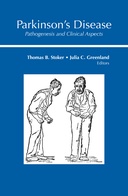Explore

Parkinson's Disease: Pathogenesis and Clinical Aspects
0 Ungluers have
Faved this Work
Login to Fave
Parkinson’s disease is an increasingly common neurodegenerative condition, which causes not only dysfunction of movement but also a broad range of nonmotor features, including mood disturbance, sleep dysfunction, autonomic dysfunction, cognitive deficits, and dementia, and neuropsychiatric symptoms. A major conundrum in this condition is understanding its striking clinical variability, which encompasses a spectrum from a benign phenotype with levodopa responsive symptoms and minimal progression, to a malignant phenotype with rapid progression to severe gait dysfunction, falls and dementia. This book integrates the considerable expertise of a range of authors from different disciplines, from clinicians through to basic scientists, to present a comprehensive and up-to-date overview of Parkinson’s disease. In recent years, we have made significant progress in understanding the pathological and genetic basis of Parkinson’s disease and its heterogeneous forms, and the first section of the book is dedicated to reviewing this. The variable clinical features of Parkinson’s disease and its differential diagnosis are then considered. The final section provides a detailed overview of treatment approaches, including not only pharmacological therapies but also surgical therapies including deep brain stimulation and cell transplantation strategies. The combination of basic biology, clinical knowledge and therapeutics gives this book a very broad appeal. It will be of value to clinicians and health professionals caring for patients with Parkinson’s disease, as well as providing an excellent introduction for junior researchers entering the field.
This book is included in DOAB.
Why read this book? Have your say.
You must be logged in to comment.
